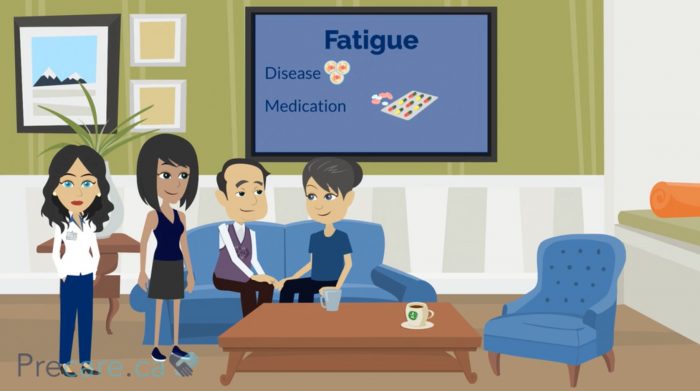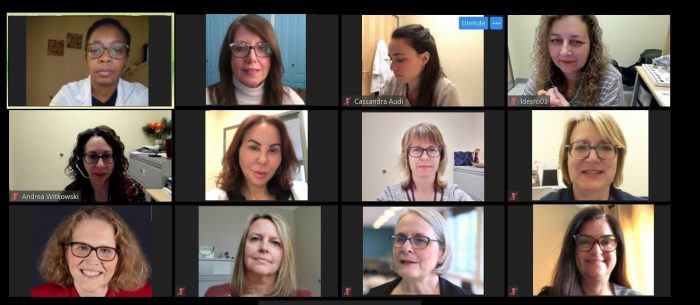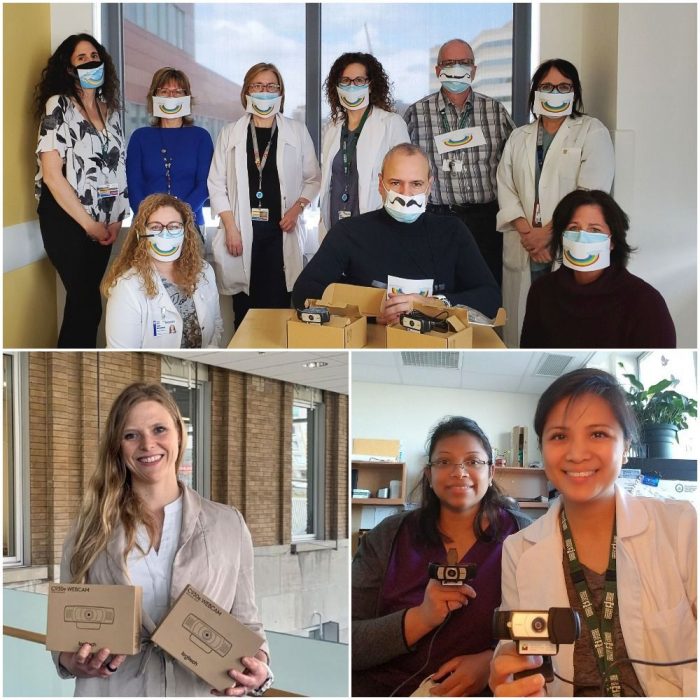By Sophie Lorenzo, Rossy Cancer Network
Cancer care can’t be put on hold. As the COVID-19 crisis hit, oncology teams were under the gun to find new ways to deliver optimal care in very challenging circumstances, allowing cancer treatments to continue and ensuring doctors’ follow-up appointments continued.
Having worked extensively with hospital stakeholders over the past years on quality improvement initiatives, the Rossy Cancer Network (RCN) has been able to move quickly to help relieve pressure on oncology teams.
The RCN set up an emergency response team to support clinical staff at each partner hospital – the McGill University Health Care Centre (MUHC), the Jewish General Hospital (JGH) and St. Mary’s Hospital Center (SMH). An RCN project manager was assigned as a point person for each institution, in bi-weekly contact with stakeholders. This allowed the RCN to get an overview of common requests and to share knowledge about potential solutions.
“RCN staff has been working with oncology teams for years. They know hospital processes and are trusted collaborators. It was easy for us to step in,” explained Dr. Wilson Miller, the RCN’s clinical lead.
Tools for Telehealth
One of the key areas where hospitals requested support was in the deployment of Zoom TeleHealth to enable clinicians to quickly implement a new process for virtual appointments. While the province was experiencing severe supply issues, the RCN was able to fast-track the purchase of 100 webcams and 45 headsets to cover the requests of oncology teams at the three sites.
In addition, RCN staff helped reduce the administrative burden on clinicians at SMH by requesting individual licenses from the Ministry of Health and Social Services (MSSS) for physicians, nurses and psychologists.
As with any IT deployment, it was expected that clinicians would need help using the new Zoom TeleHealth software and that tech support lines would be swamped. As a result, the RCN set up a dedicated phone line staffed by RCN super-users for partner oncology departments, to ensure that their technical issues with the new app were dealt with in a short time frame.
Based on the needs of each hospital, the RCN has offered one-on-one training for pivot nurses, physicians and psychologists in order to streamline software installation and resolve connection issues. “We have to give a huge thank you to the RCN for supporting our teams in continuing to offer the best care for our patients in oncology,” said Christine Bouchard, clinical administrative coordinator for oncology at the Cedars Cancer Centre of the McGill University Health Centre, after a recent telehealth kick off meeting with MUHC pivot nurses.
In certain oncology clinics at the JGH, RCN staff are also working alongside admin teams in order to take over the time-consuming task of setting up Zoom meetings for patient appointments, troubleshooting any issues with physician connections and responding to patients’ IT questions.
To help reduce visits to the hospital, some sites have replaced in-person orientations with education videos. The RCN helped fast-track patient teaching videos on chemotherapy and immunotherapy for the JGH. Within two weeks of the start of the crisis, the RCN had also created a COVID-19 specific video to help patients better protect themselves. These resources are now available to all the oncology teams online at www.mcgill.ca/rcr-rcn/resources.
RCN staff are now working with nutritionists at SMH and the JGH to produce a video on nutrition for people going through cancer treatment. “We usually give a presentation to help our patients maintain their weight and prevent some of the side effects of chemotherapy. Since the COVID-19 pandemic, all new patients are given this information by phone. A video will be incredibly helpful,’’ explained Sandra Grant, oncology dietitian at SMH.
Managing symptoms at home
The RCN has a number of initiatives to help patients manage symptoms from home. An award-winning RCN urgent care initiative was already supporting patients and reducing their need to visit an emergency department, thanks to dedicated phone lines staffed by nurses at each partner hospital. At the JGH, the urgent care resource is now also providing important support and education to anxious patients facing their cancer treatment during COVID-19.
At SMH, an RCN project coordinator is helping to complete remote distress screening (ESAS questionnaire) with patients — something that usual takes place in hospital ahead of their appointments in psychosocial oncology. Additional sites are considering ways to implement remote screening as well.
To help patients find answers and resources quickly to manage symptoms related to their treatments, an RCN team compiled 15 symptom management guides for patients. These one-page info sheets are based on best practices from leading cancer care organizations, and include hospital-specific references for support.
“During this most challenging time, the RCN has been able to help support the oncology team. We would not have been able to accomplish everything we have in such a short time without their valuable contribution,” said Erin Cook, clinical administrative coordinator for Oncology at the Segal Cancer Centre of the Jewish General Hospital.
As oncology teams look for more ways to adapt to a new normal, the RCN continues to develop new initiatives to help lighten the load on front-line staff, so they can do what they do best, and focus on their patients.
***************************
The Rossy Cancer Network (RCN) is a partnership of McGill University’s Faculty of Medicine, the McGill University Health Centre, the Jewish General Hospital and St. Mary’s Hospital Center. The RCN’s mission is to improve cancer care quality and the experience of individuals with cancer navigating the health care system. We do this by measuring and reporting on health care performance, driving quality improvement initiatives, funding research and education and connecting health professionals across the McGill network. #fundingexcellence #unitingcare
Mcgill.ca/rcr-rcn
May 7 2020



